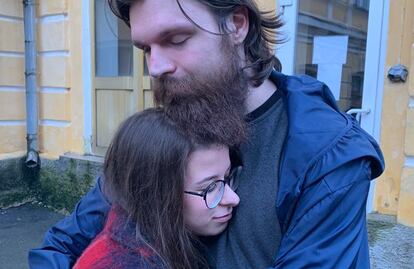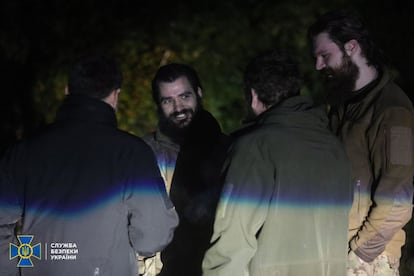Love in times of war: Ukrainian POW and girlfriend reunited after prisoner exchange
Lieutenant Ilia Samoilenko served at Mariupol with the Azov Regiment and was taken prisoner after the city’s fall, but has now been released.


“One day I hope to become his wife,” says 22-year-old Dariia Tsikunova of her partner, Lieutenant Ilia Samoilenko, who lost his right and eye and left hand in combat and was among a group of Ukrainian prisoners of war who were released by Russia last Wednesday after being held for over four months. The prisoner exchange carried out that day was the largest of the war so far, with almost 300 POWs returning to their homes. Of these, 215 were Ukrainian military personnel, including 10 foreign fighters, and 56 were Russian soldiers or pro-Russian Ukrainian militia. The exchange took place in the Chernihiv region in northern Ukraine, which borders Russia. “Many of them suffered very cruel forms of torture,” Kirill Budanov, Ukraine’s military intelligence chief, said of prisoners returned to Kyiv.
Samoilenko had been held in solitary confinement in Moscow, his mother, Alla Samoilenko, told Ukrainian broadcaster Canal 5 after speaking to her son by telephone. It was one of the few details that has emerged regarding the Ukrainian prisoners as the authorities are still gathering information and many of them remain hospitalized. Dariia either did not know or prefers not to talk about Samoilenko’s ordeal. She did though confirm that one of the places he had passed through was Olenivka, a town near Donetsk where the Russians have set up a prison for captured Ukrainian soldiers, where an attack in July led to the deaths of 40 Ukrainian prisoners of war.
Dariia was not present when the exchange took place but she was authorized, as were other friends and family members of the prisoners, to visit their loved ones beforehand. She said that she was finally able to hug Samoilenko, who unlike many others had not sustained any serious injuries during his incarceration, at a hospital in Chernihiv. Although she refuses to complain, they were not able to spend much time together, and they were never alone. “We weren’t able to talk much. It is very hard for him to process everything that has happened and he is recovering. He doesn’t talk much about his captivity because it has been traumatic and he is going to need time. He is undergoing treatment in a hospital and I hope he recovers soon,” Dariia said.

Samoilenko, a fan of the works of J. R. R. Tolkien and whose nickname is Gandalf, turned 28 while in the hands of the Russian military. On that day, Dariia says that she didn’t do anything but stayed at home and didn’t want to see anyone, barely adding a few lines to the diary she has kept to express how much she loves and missed her boyfriend. She also wrote that she was still waiting for him. These pages have become her own personal weapon, far from the front lines, “to fight for him” and make the wait less bitter. “It is an honor to be the girlfriend of a hero,” she told EL PAÍS during a telephone conversation.
Dariia and Ilia had been friends until last February, when they became a couple. They did not know, despite the persistent rumbling of threat from Moscow, that their country was on the verge of a full-scale war. On February 19, a few days before Russia launched its invasion, he traveled to Mariupol. That was the last time they were together until the brief moments they shared after his liberation. Mariupol would swiftly become the scene of one of the fiercest and bloodiest battles of the war, where hundreds of civilians and members of the Ukrainian Azov Regiment, surrounded by Russian troops, made a stand at the Azovstal Iron and Steel Works.
Meeting with the pope
Alla Samoilenko is currently in the United States as part of a mission of wives and mothers of prisoners who were taken during the battle for the Azovstal plant to demand their release. Two of them were even received by Pope Francis at the Vatican a few days after their husbands fell into Russian hands. Katerina Prokopenko, the wife of Azov Regiment commanding officer Lieutenant Colonel Denys Prokopenko, asked the pontiff “not to allow them to die,” adding: “You are our last hope.”
For several weeks, Ilia Samoilenko acted as spokesman for the regiment, which forms part of the National Guard of Ukraine. He conducted interviews and issued statements from the besieged iron and steel works, which made him one of the most recognizable and popular faces of Ukrainian resistance. Surrounded and out of food and ammunition, the Azovstal defenders were finally forced to surrender on May 16 as Russian forces took the last stronghold in Mariupol and declared the city under Moscow’s control. “We haven’t been able to speak since May 20. It has been horrible not to have had any word from him in four months,” says Dariia. The liberation of some of the Mariupol prisoners of war – hundreds remain in detention – was made possible after a behind-the-scenes agreement was reached after months of work by the Ukrainian secret service, according to Mijailo Podoliak, an advisor to Ukrainian President Volodymir Zelenskyy.
Having grown accustomed to rumors of a prisoner exchange involving Samoilenko and other members of the Azov Regiment, Dariia did not want to get her hopes up. Furthermore, soldiers of the Azov Regiment, which was founded in 2014 by far-right militants as a volunteer paramilitary unit to fight pro-Russian forces during the Donbas war, before later being integrated into the National Guard, are highly prized by Russian occupation authorities, after the Kremlin justified its invasion as an attempt to carry out a “denazification” of Ukraine. One of the stipulations of the agreement was that Prokopenko and four other high-ranking Azov commanders would spend the remainder of the war in Turkey. “We had been warned that the Azov soldiers would be the last,” says Dariia, without hiding her surprise that this proved not to be the case.
Samoilenko enlisted in the Azov battalion in 2015, when he was 21 years old. “He wanted to join in 2014 but he was too young, so he decided to study History at university,” Dariia says. Conflict broke out in Donbas in 2014, when Moscow-backed pro-Russian militia groups fought the Ukrainian army. On New Year’s Eve, 2017, Samoilenko was seriously wounded while handling an explosive device during an attack. He lost his right eye and his left hand, where he sometimes wears a metal hook. That did not prevent him though from heading for the front lines again when Vladimir Putin ordered the invasion in February.
Samoilenko’s mother says that Ilia has often fallen back on gallows humor over the years to come to terms with his appearance and that before he was taken prisoner, he had been visiting wounded soldiers in Mariupol to help them after they had been wounded. Now, she told Canal 5, it is her son who faces months of recuperation after his “isolation and loneliness.”
Tu suscripción se está usando en otro dispositivo
¿Quieres añadir otro usuario a tu suscripción?
Si continúas leyendo en este dispositivo, no se podrá leer en el otro.
FlechaTu suscripción se está usando en otro dispositivo y solo puedes acceder a EL PAÍS desde un dispositivo a la vez.
Si quieres compartir tu cuenta, cambia tu suscripción a la modalidad Premium, así podrás añadir otro usuario. Cada uno accederá con su propia cuenta de email, lo que os permitirá personalizar vuestra experiencia en EL PAÍS.
¿Tienes una suscripción de empresa? Accede aquí para contratar más cuentas.
En el caso de no saber quién está usando tu cuenta, te recomendamos cambiar tu contraseña aquí.
Si decides continuar compartiendo tu cuenta, este mensaje se mostrará en tu dispositivo y en el de la otra persona que está usando tu cuenta de forma indefinida, afectando a tu experiencia de lectura. Puedes consultar aquí los términos y condiciones de la suscripción digital.








































